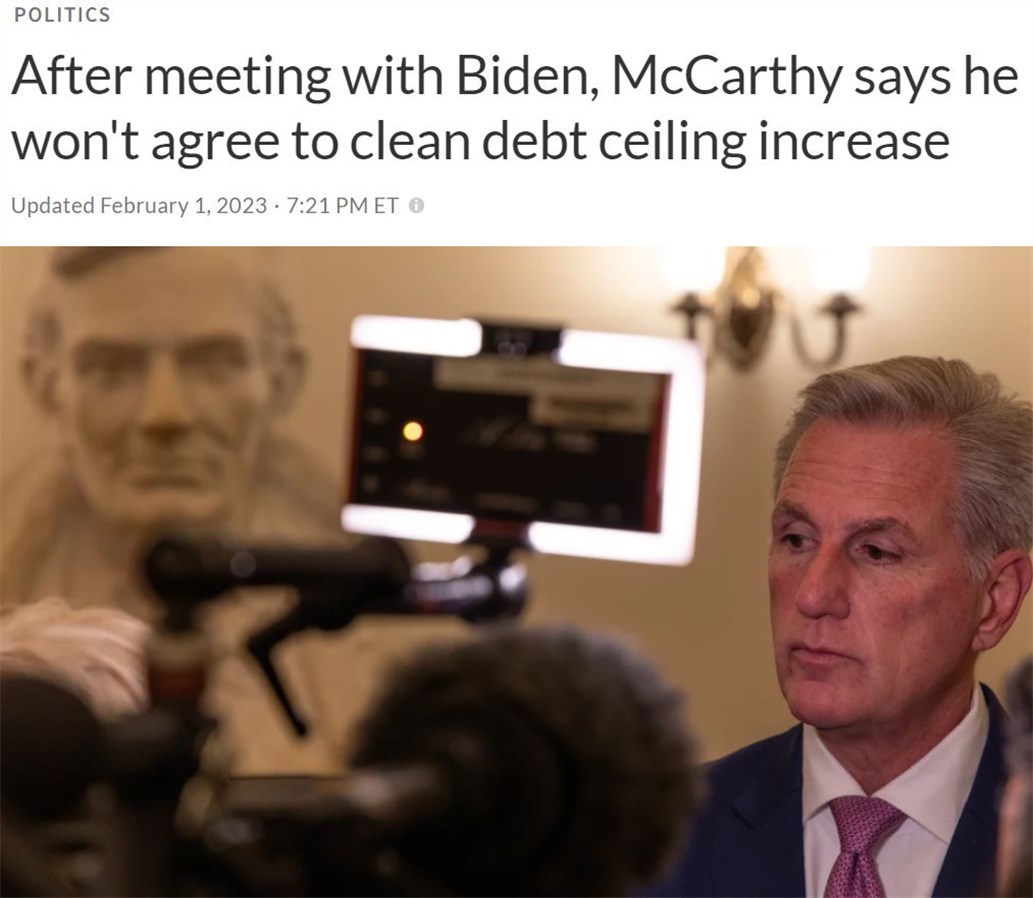On February 1, local time, U.S. President Biden and Republican House Speaker McCarthy failed to discuss raising the debt ceiling; The highest level; on the same day, the European Commission launched its own green industry plan, highlighting its determination to maintain a leading position in the global green industry.
On the surface, these three events that happened in one day seem to be unrelated, but in fact they are causal and interlocking, and reflect the truth that the irresponsible economic chaos in the United States is harming the The world, too, has bogged itself down.
Backlash 1: Debt default risk
On February 1, local time, U.S. President Biden and Republican House Speaker McCarthy had their first meeting after McCarthy took office to discuss how to avoid a U.S. debt default. Although McCarthy told reporters after the meeting that the discussions were “productive,” and the White House described the talks as “frank and direct,” the two sides failed to reach an agreement on raising the federal government’s debt ceiling.
NPR: After meeting with Biden, McCarthy says he won’t agree to outright debt ceiling hike
Earlier last month, U.S. government debt reached the latest statutory debt ceiling of $31.4 trillion. The U.S. Treasury Department had to take “extraordinary measures” to continue to meet payment obligations, but these measures are only expected to last until early June.
U.S. Treasury Secretary Yellen has repeatedly warned recently that if the two parties in Congress do not raise the debt ceiling this summer, the U.S. will face a terrible debt crisis and a spiral economic recession. But at a time when political polarization in the United States is becoming increasingly acute, the policy tool of the “debt ceiling” has long evolved into an outright partisan tool.
What’s more troublesome is that in order to become the Speaker of the House of Representatives, McCarthy has made huge concessions to the hardliners in the Republican Party. “Increasing the debt ceiling must be combined with spending cuts” is an important one.
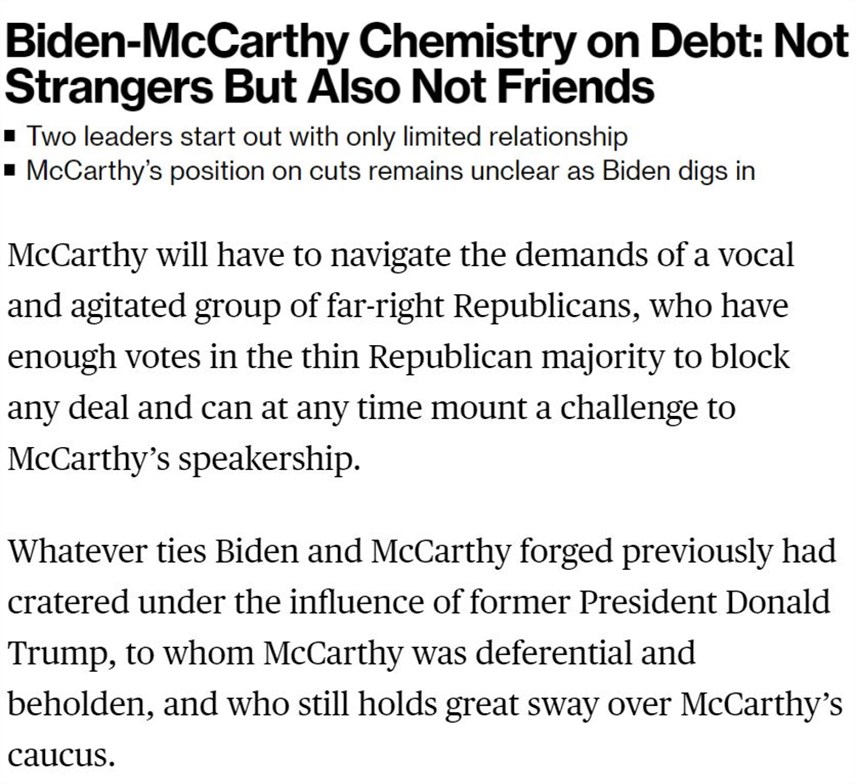
Bloomberg reported on Feb. 2 that McCarthy would have to contend with demands from far-right Republicans, who have enough votes in their razor-thin Republican majority to block any deal and could challenge McCarthy for speakership at any time. In addition, McCarthy respects Trump and is grateful to Dade. Trump still has a lot of influence on McCarthy’s caucus. He has been urging Republicans to “get tough” on the debt ceiling issue.
It can be predicted that in the next few months, the two parties will launch an extremely fierce battle over the debt ceiling. At present, the United States is already facing the risk of falling into recession in the next year. Once the debt ceiling is breached, the financial market will plummet and the public’s borrowing costs will be pushed up.
Recently, many economists have also issued warnings.
Jonathan Lavin, co-managing partner of private equity firm Bain Capital, said that if the U.S. Congress got into a debate about whether to raise the debt ceiling, it would damage the U.S. economy and disrupt global financial markets. “The debt ceiling is a real risk, and it’s going to reach a point that scares markets.”

Screenshot of Reuters report
Michael Feroli, chief U.S. economist at JPMorgan Chase & Co., warned that the impact of a default is hard to predict but could lead to a “severe recession.”
Alec Phillips, chief political economist at Goldman Sachs, believes that “the risk of government debt default is greater than at any time since 2011.”
Pablo Villanueva, senior U.S. economist at UBS, further warned that “this is a debt ceiling event that is a bit different than before” because the Fed is implementing tightening policy and “very quickly” after years of monetary stimulus. “Remove cash from the economy. “That’s why I think the debt ceiling is particularly important this time around.”
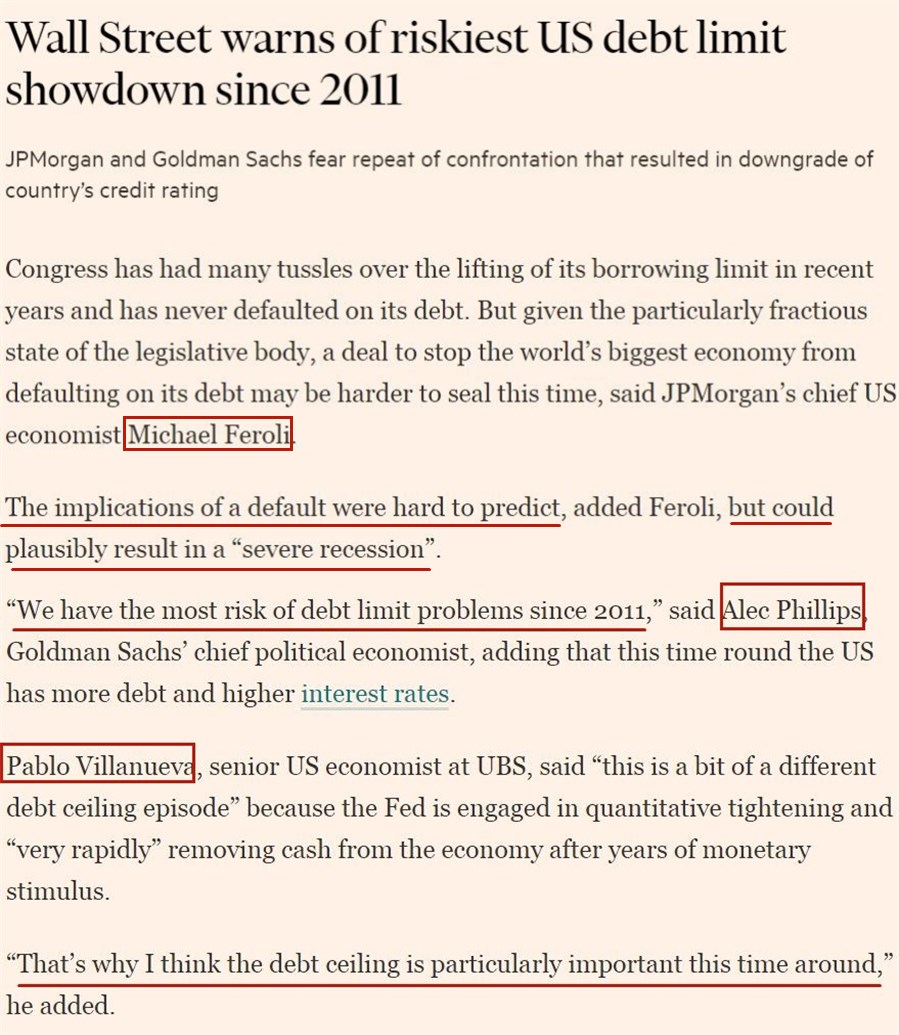
Screenshot of Financial Times website report
Backlash 2: The bad effect of raising interest rates
Villanueva was right. Also on February 1, the Federal Open Market Committee (FOMC) announced that it would raise the target range of the federal funds rate by another 25 basis points to between 4.50% and 4.75%.
Federal Reserve Chairman Powell said at the press conference that although the current data show that US inflation has eased, it is still far from reaching the target, and the Fed will continue to raise interest rates, saying that continuing to raise interest rates is appropriate.
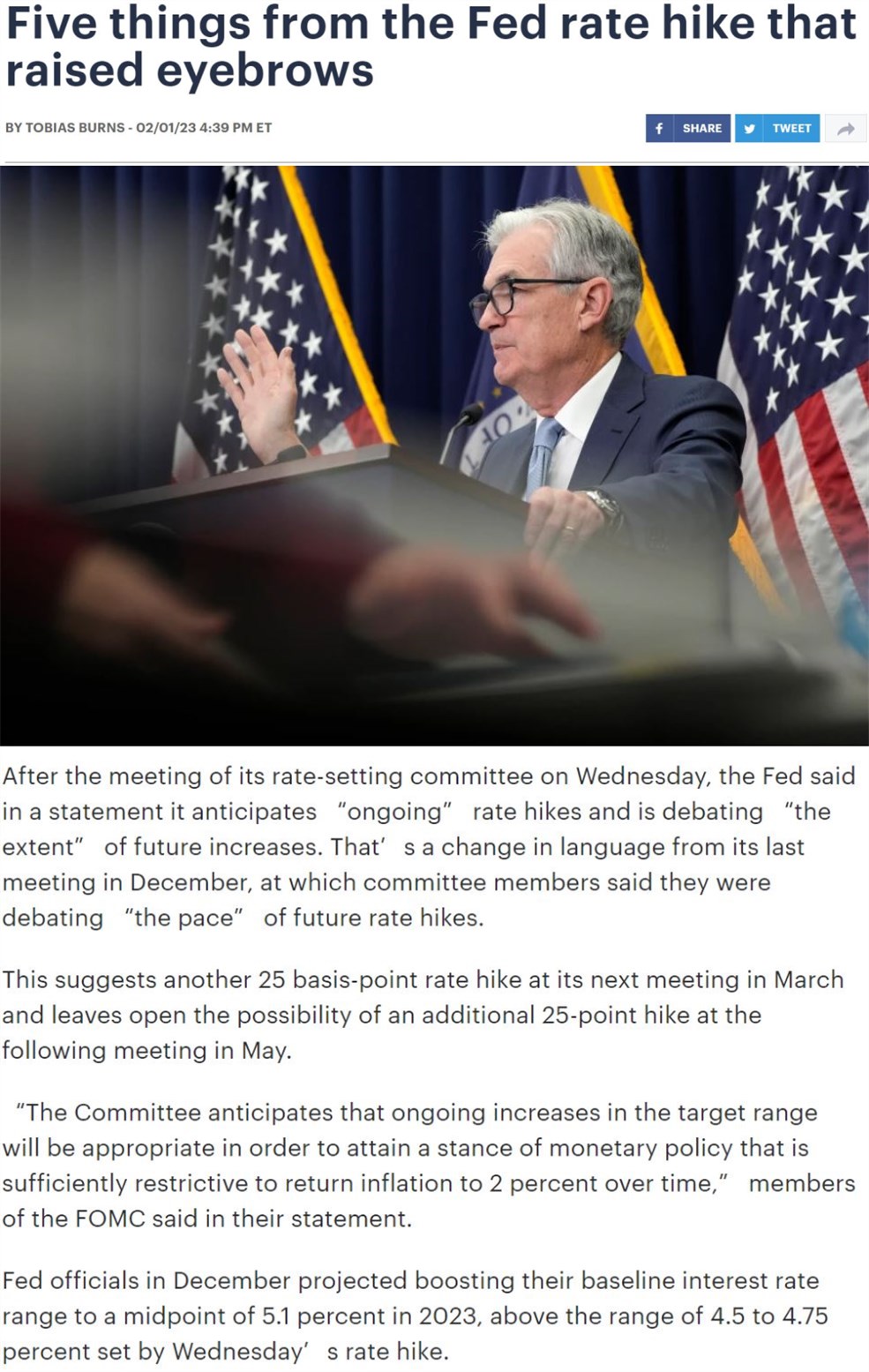
“Capitol Hill” reports: The Federal Reserve is firmly committed to reducing inflation. That means another 25 basis point hike at the next meeting in March is likely, and another 25 basis point hike at the next meeting in May also remains a possibility. Fed officials had projected in December to raise the benchmark interest rate range to the midpoint of 5.1 percent in 2023, up from the range of 4.5 percent to 4.75 percent reached after the Feb. 1 hike.
In response to the high inflation caused by itself, the Federal Reserve has raised interest rates aggressively for the eighth time since March last year, causing the federal funds rate to reach the highest level since October 2007, but it has not achieved the desired effect.
As interest rates continue to rise, this madness not only brings the United States closer and closer to an economic recession, but also causes the whole world to take the blame for the United States.
Affected by the Fed’s tightening policy, the currencies of many countries in the world have depreciated sharply against the U.S. dollar this year. The strong U.S. dollar has induced a large-scale flow of funds to the United States, which has severely impacted the stock markets, bond markets, and foreign exchange markets of many countries.
In order to reduce their losses, these countries had to follow the US to raise interest rates passively, thereby aggravating the risk of their own economic recession. The European Central Bank and the Bank of England have announced on February 2 to raise interest rates by 50 basis points.
The appreciation of the U.S. dollar has also plunged developing economies that need to repay their debts in U.S. dollars, especially those with insufficient foreign exchange, into a debt crisis.
In a report published in late 2022, the United Nations Conference on Trade and Development warned that monetary tightening to fight inflation could cause “worse damage than the 2008 financial crisis and the impact of the new crown epidemic” on a global scale.
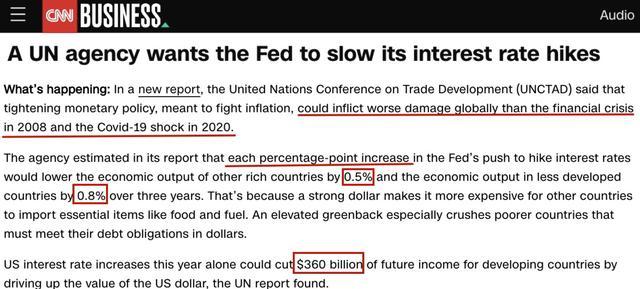
CNN reported: The United Nations Conference on Trade and Development report stated that it is estimated that every 1 percentage point increase in interest rates by the Federal Reserve will reduce the economic output of other developed countries by 0.5% within three years, and the economic output of developing countries. will be reduced by 0.8%. The report also mentioned that the US interest rate hike in 2022 alone may reduce the future income of developing countries by US$360 billion.
Facing the harm of the dollar hegemony to the world economy, more and more economies have begun to take practical actions to protect their own rights and interests.
Credit Suisse said in a Feb. 1 report on the future of the monetary system that the dollar’s importance in global foreign exchange reserves “seems likely” to continue to wane. There is evidence that the world‘s major central banks are diversifying their investments and reducing their reliance on the U.S. dollar, possibly primarily to avoid the risk of U.S. sanctions.
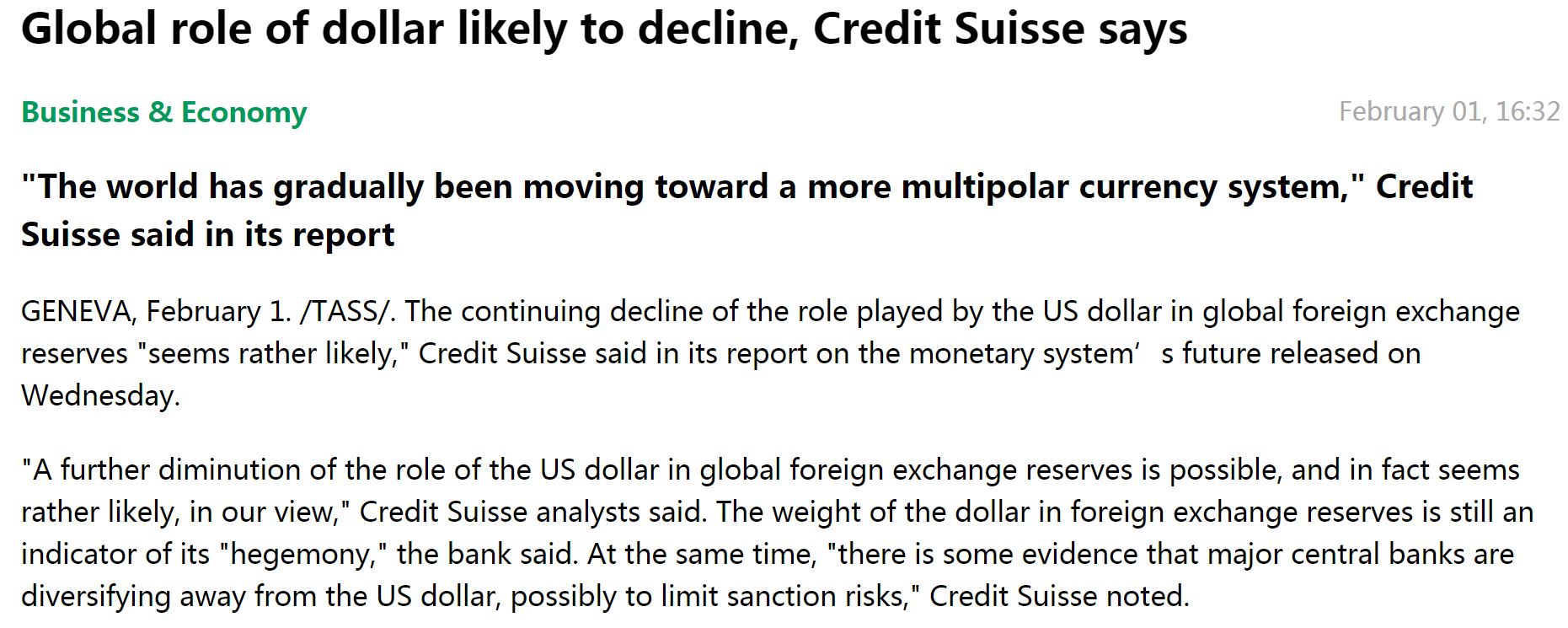
The TASS news agency quoted a report from Credit Suisse Bank as saying that analysts pointed out that after the escalation of the conflict between Russia and Ukraine, the United States used currency weapons to impose severe sanctions on Russia, prompting many countries to seek to get rid of their dependence on the US dollar.
Backlash 3: Protectionist policies that make allies angry
In order to save the economic decline caused by its own policy mistakes, the United States, which “does not want others to be better than itself”, not only uses the hegemony of the dollar to export inflation and economic recession risks to other countries indiscriminately, but also ignores the rules-based international trade order. “Priority” protectionism, even at the expense of “joint sacrifices” by all of its allies.
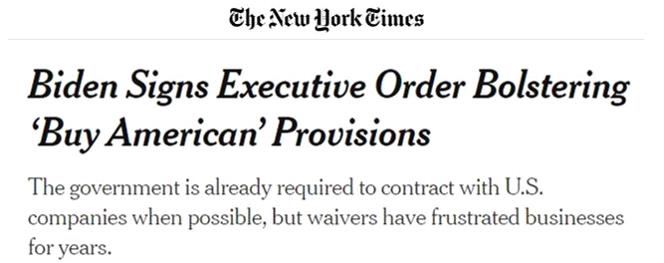
“New York Times”: After taking office in January 2021, US President Biden signed an executive order to support the purchase of American goods to help US companies more easily squeeze out foreign competitors.
Taking advantage of the Ukrainian crisis provoked by itself, the United States took the opportunity to export high-priced energy to Europe to make a fortune, and at the same time introduced unilateral subsidy policies such as the “Inflation Reduction Act” to induce European companies that have been hit hard by the energy crisis to reduce their production capacity. And investment shifted to the United States, which plunged Europe into a crisis of “deindustrialization”.
In the face of allies’ criticism of US trade protectionism, the US has turned a blind eye and continued to go its own way.
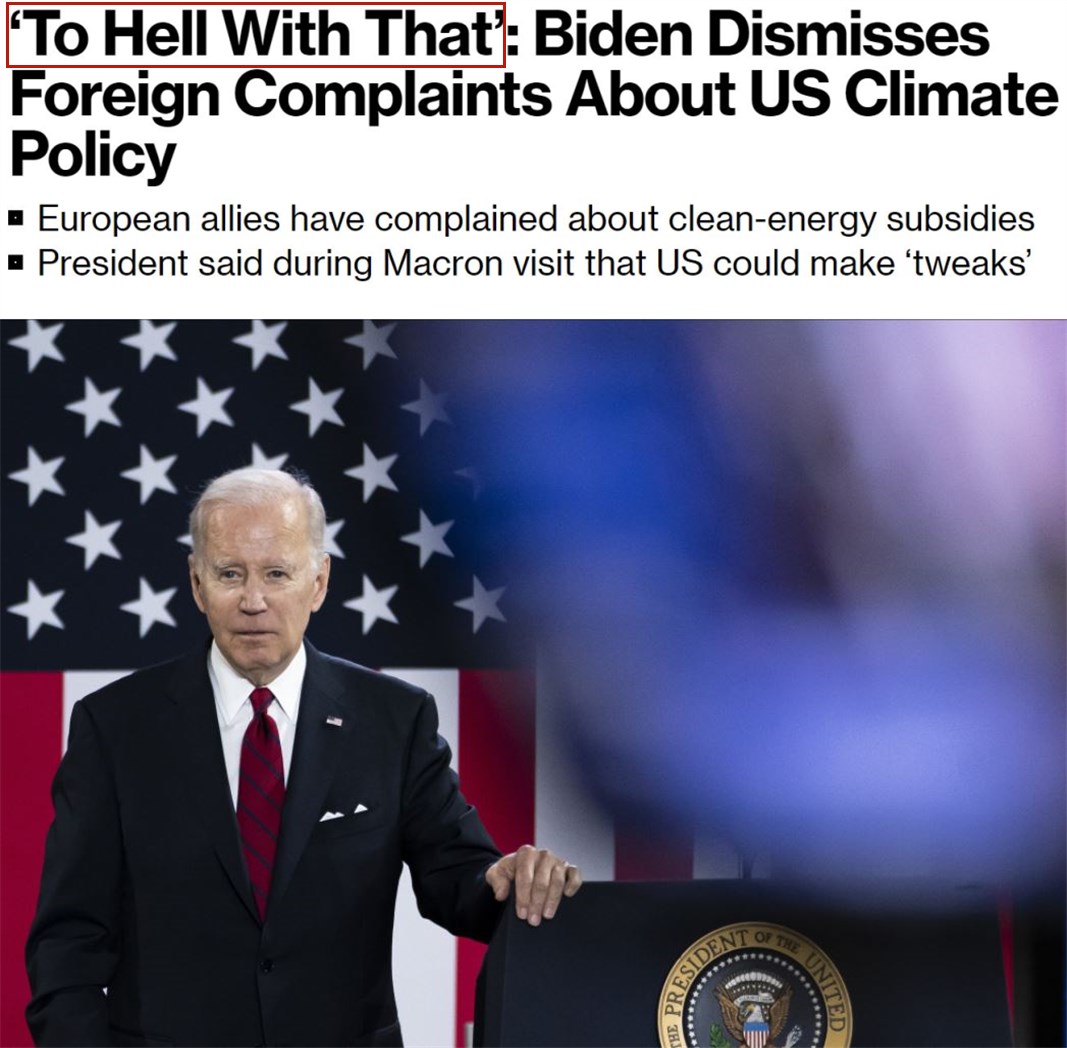
Bloomberg reported that Biden said in a speech to unionized workers in Virginia: “You can see that I have been criticized internationally for being too focused on the interests of the United States. Let them go to hell.”
After repeated communication with the United States was ineffective, the European Union, France, Germany and other major EU member states have warned that if the United States does not change its protectionist policy, the European Union may bring the lawsuit to the WTO and will introduce similar policies to counter it.
On February 1 local time, the European Commission proposed a green industry plan. The proposal, due to be presented to EU leaders next week, would allocate 250 billion euros ($272 billion) from existing EU funds to green industries, including tax incentives for companies investing in net-zero emissions technologies.
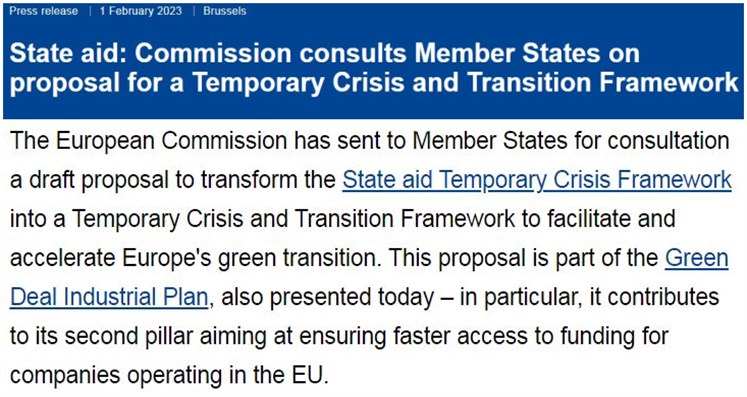
Screenshot of the official website of the European Commission
Analysts generally believe that because the U.S. “Inflation Reduction Act” provides high subsidies for green industries, the EU’s plan is to prevent electric vehicles and other related green industries from moving out of Europe and maintain the EU’s position as a global green industry center.

CNN: Europe Unveils $270 Billion Response to U.S. Green Subsidies

The independent energy market analysis agency “Argus Media” reported on the website: In the face of the US “Inflation Reduction Act” (IRA), the European Commission has formulated a plan to improve the competitiveness of the EU’s “green industry”.
Material source丨Global Information Broadcasting “Global Deep Observation”
Planning丨Wang Jian
Reporter丨You Jia
Editor丨Yang Nan
Signing review丨Zhang Zhe
Producer丨Juanjuan Guan
[
责编:丁玉冰 ]
